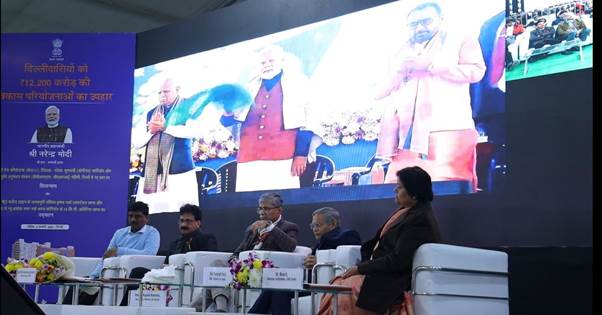Prime Minister Narendra Modi on Sunday virtually laid the foundation stone for the new Central Ayurveda Research Institute (CARI) building in Rohini, New Delhi. The state-of-the-art facility, spanning 2.92 acres and built at a cost of ₹187 crore, is poised to become a global hub for Ayurvedic research and healthcare.
Speaking at the event, Prime Minister Narendra Modi described the initiative as “Ayurveda’s next big leap,” reaffirming the government’s dedication to promoting traditional Indian medicine systems such as Ayurveda and AYUSH. He highlighted AYUSH’s global reach, now extended to over 100 countries, and introduced the AYUSH visa, a special provision designed to welcome foreign nationals seeking traditional Indian treatments.
“India has immense potential to become the world’s health and wellness capital,” the Prime Minister said, adding that the world will soon embrace “Heal in India” alongside “Make in India.” He noted that the project aligns with the government’s focus on accessible healthcare, benefiting even the most underserved communities.
A state-of-the-art facility for holistic healing
The new CARI campus will feature a 100-bed research hospital and facilities for advanced clinical research, education, and treatment. Divided into four blocks—Administrative, Outpatient Department (OPD), Inpatient Department (IPD), and Treatment, the institute will offer specialized clinics for geriatrics, pediatrics, ENT, arthritis, preventive cardiology, and eye care. It will also integrate traditional therapies like Panchakarma, Kshara Sutra, and leech therapy with modern diagnostic tools.
Union Minister of State for AYUSH, Prataprao Jadhav, praised the Prime Minister’s visionary leadership during the ceremony, highlighting the transformative potential of the new facility to advance Ayurvedic research and elevate healthcare standards.
Yogender Chandolia, currently serving as Member of Parliament from North West Delhi, lauded the government for the dual milestones of the new metro line inauguration and the CARI foundation stone laying. He described the developments as a “gift” to the people of Delhi, underscoring the long-term benefits of the institute to the city’s residents.
Advancing ayurvedic research
Since its establishment in 1979, CARI has been at the forefront of Ayurvedic clinical research, particularly in preventive cardiology and non-communicable diseases. Having operated from rented premises for decades, the institute’s new campus will elevate its capacity for cutting-edge research, treatment, and skill development.
Secretary of AYUSH, Vaidya Rajesh Kotecha, highlighted the significance of acquiring a permanent facility after 46 years. “This futuristic building will provide high-quality services, enhancing awareness and accessibility of traditional medicine,” he said.
Equipped with NABH and NABL accreditations, the institute aims to set new benchmarks in quality healthcare. It also offers a Panchakarma Technician Training Course, empowering youth with valuable skills and contributing to the growth of the traditional medicine sector.
The CARI project is expected to be completed within 30 months.




















